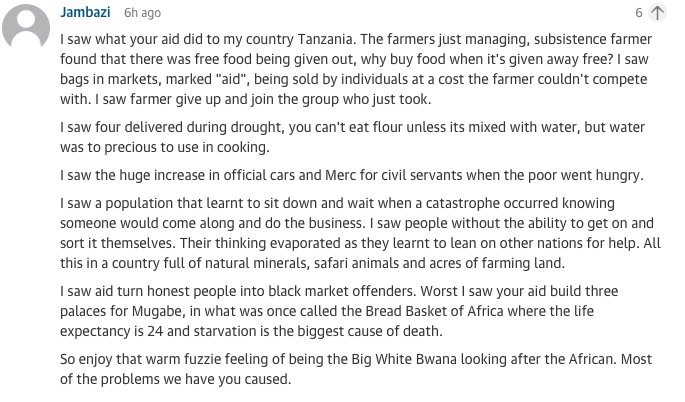****
I get the anger at there being cuts at home while the budget for international aid has been protected. And, for the record, I don't support the mandated 0.7%, the de facto hypothecation of the budget or the preference for bilateral deals. But having an international aid budget isn't simply a case of us rich folk being nice to poor people in Africa. Investing in those places - helping them develop - is absolutely in our interests.
As we've been reminded:
Whether it was the Mediterranean's deadliest refugee drowning in decades
remains to be seen. But it was certainly terrible, and its political
effects could spread far. One of the survivors of a refugee boat that
capsized late on the night of April 18th in the waters between Libya and
the Italian island of Lampedusa said that at least 700 people had been
on board. Just 28 have been rescued so far. That would make it by far
the worst maritime disaster in the Mediterranean since the second world
war.
A great deal has been made of the
decision by the EU (and individual states including Britain) to end "planned search and rescue operations in the Mediterranean" because it was believed that fishing refugees from out of the sea only encouraged more of them to attempt the risky crossing. I do not support this policy - it is quite simply inhumane. I remember the suggestion - I think from P J O'Rourke - that instead of turning these folk away, we should be on the beach with a towel and a passport. We keep saying how we want risk-takers and people with get up and go - isn't that the very definition of these refugees?
The solution, if that's the right word, is for there to be less reason to leave Africa in the first place. And while war and the depredations of lousy government are part of the story, economic opportunity is central - just like us, these Africans are seeking to better their lives and are taking enormous risks in doing so.
And this is why we have an aid budget. It's also why that
aid is better directed through multilateral agencies like the World Bank and International Monetary Fund than through cosy bilateral deals or, worst of all, through the agency of well-meaning but
wrong-headed NGOs. Right now our aid programmes are a mixture of anti-globalist nonsense, the subsidising of rural poverty and a few strong infrastructure programmes (mostly around health and education). It's not the size of the budget but its direction that is the problem - we need investment that comes with strings, with a bit of that
Washington Consensus that the left are so touchy about but which has been the single biggest reason for reductions in world poverty.
So long as the gap between opportunities here and opportunities there exists people will try to arbitrage the gap - some will be ordinary economic migrants, students and the like. But there's big money to be made smuggling people across borders and, as the Americans have found, it's almost impossible to stop people crossing those borders. So investing in those countries so they have the infrastructure needed for development makes every kind of sense if we want to prevent out richer places being a huge magnet for the billion or so folk out there who'd like a better life.
....
